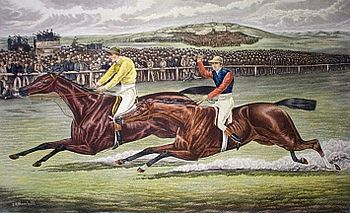
Ormonde was an undefeated English Thoroughbred racehorse who won the 1886 English Triple Crown and was labelled the 'horse of the century' at the time. He also won the St. James's Palace Stakes, Champion Stakes and the Hardwicke Stakes twice. Ormonde was trained at Kingsclere by John Porter for the 1st Duke of Westminster. His regular jockeys were Fred Archer and Tom Cannon. After retiring from racing he suffered fertility problems, but still sired Orme, who won the Eclipse Stakes twice.
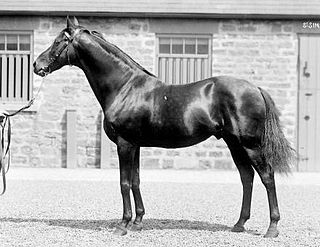
St. Simon was an undefeated British Thoroughbred racehorse and one of the most successful sires in the history of the Thoroughbred. In May 1886 The Sporting Times' carried out a poll of one hundred experts to create a ranking of the best British racehorses of the 19th century. St. Simon was ranked fourth, having been placed in the top ten by 53 of the contributors.
The 1993 Epsom Derby was a horse race which took place at Epsom Downs on Wednesday 2 June 1993. It was the 214th running of the Derby, and it was won by Commander in Chief. The winner was ridden by Michael Kinane and trained by Henry Cecil. The pre-race favourite Tenby finished tenth.

Swynford was a British Thoroughbred racehorse. Bred at the 16th Lord Derby's stud in Lincolnshire, England he was sired by John O'Gaunt, a son of Isinglass, winner of the British Triple Crown in 1893. His dam was Lord Derby's foundation mare and 1896 Epsom Oaks winner Canterbury Pilgrim who also produced Chaucer, the 1927 and 1933 Leading broodmare sire in Great Britain & Ireland.

Melton (1882–1910) was a British Thoroughbred racehorse and sire. In a career that lasted from 1884 to 1886 he ran eighteen times and won eleven races. In 1885 he won the second two legs of the English Triple Crown, the Derby at Epsom and the St Leger at Doncaster. At the end of the 1886 season he was retired to stud where he had considerable success in both Italy and Great Britain.
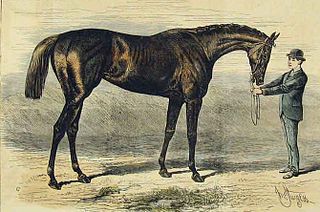
Shotover (1879–1898) was a British Thoroughbred racehorse and broodmare. In a career that lasted from 1882 to 1884, she ran 15 times and won five races. As a three-year-old, racing against colts, she became the first filly to win the first two legs of the English Triple Crown: the 2000 Guineas at Newmarket and the Derby at Epsom. She went on to win twice at Royal Ascot, but failed in her bid for the Triple Crown when she finished third in the St Leger at Doncaster. She was retired in 1884 and became a successful and influential broodmare. Shotover died in 1898.
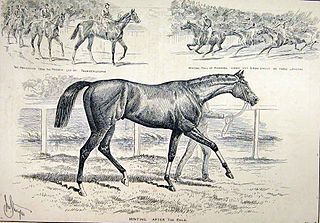
Minting (1883–1909) was a British Thoroughbred racehorse and sire. In a career that lasted from 1885 to 1888 he ran twelve times and won nine races. He was the leading British two-year-old of 1885 and went on to win the Grand Prix de Paris in June 1886. His career was often overshadowed by that of his contemporary Ormonde who defeated him on both of the occasions they met on the racecourse.

Orme was a British Thoroughbred racehorse. He was trained at Kingsclere by John Porter for the 1st Duke of Westminster. As a two-year-old he won the Middle Park and Dewhurst Stakes. As a three-year-old he was not well enough to take part in the 2000 Guineas and Epsom Derby, but came back to win the Eclipse Stakes. Orme stayed in training as a four-year-old and won another Eclipse Stakes, becoming the first horse to win the race twice, a feat that has only been repeated four times since. After he had retired from racing, he became a successful sire and was Champion sire of Great Britain in 1899. His son Flying Fox won the Triple Crown and the Eclipse Stakes. Orme also sired Epsom Derby winner Orby and 1000 Guineas winner Witch Elm. His regular jockeys were George Barrett and Morny Cannon.

The Bard (1883–1902) was a British Thoroughbred racehorse. He was owned by Robert Peck and Owen Williams. Robert Peck was also his trainer. He won 23 of his 25 races, including the Goodwood Cup and Doncaster Cup in 1886. He also finished second in to Ormonde in The Derby.

Kendal (1883–1908) was an English Thoroughbred racehorse. He was trained at Kingsclere by John Porter for the 1st Duke of Westminster. He was a leading two-year-old, but retired due to injury. He later became a successful stallion and was Champion sire in 1897.
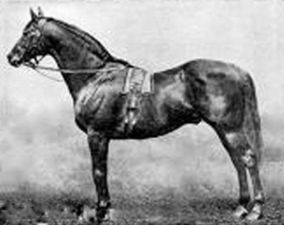
Friar's Balsam (1885–1899) was an English Thoroughbred racehorse. He was the outstanding British two-year-old of 1887, when he was unbeaten in seven races. He was a sick horse when a beaten favourite in the following year's 2000 Guineas, but returned in the autumn to beat Minting in the Champion Stakes. Friar's Balsam was retired to stud where he had some success as a sire of winners. He was trained at Kingsclere by John Porter for Lord Alington and Sir Frederick Johnstone.

Petrarch was a British Thoroughbred racehorse and sire who won two British Classic Races in 1876. In a career that lasted from October 1875 to October 1878 he ran sixteen times and won eight races. In 1875, Petrarch won the Middle Park Stakes on his only appearance of the season. As a three-year-old in 1876 he won two of the three races which comprise the Triple Crown, taking the 2000 Guineas at Newmarket and the St Leger at Doncaster. He finished unplaced when favourite for The Derby. As a four-year-old he won three races including the two and a half mile Ascot Gold Cup which at that time was regarded as the most important weight-for-age race in the world. Petrarch was regarded by contemporary experts as a brilliant, but inconsistent performer. After winning once as a five-year-old in 1878 he was retired to stud where he became a successful sire of winners.

Miss Jummy (1883–1889) was a British Thoroughbred racehorse and broodmare who won two British Classic Races in 1886. In a career that lasted from July 1885 to September 1886 the filly ran fifteen times and won eight races at distances ranging from five furlongs to one and three quarter miles. As a two-year-old in 1885, Miss Jummy won three times from seven starts, but when tried in the highest class she was unplaced behind the future Triple Crown winner Ormonde in the Dewhurst Stakes. In 1886, Miss Jummy was unbeaten when racing against her own age and sex, winning five races including the 1000 Guineas at Newmarket, the Oaks at Epsom, the Nassau Stakes at Goodwood and the Park Hill Stakes at Doncaster. She was unsuccessful in open competition, finishing unplaced in the Grand Prix de Paris and the Eclipse Stakes. At the end of 1886 she was retired to stud where her record was disappointing.
Bendigo was a British Thoroughbred racehorse. He was owned by H. T. Barclay and trained by Charles Jousiffe. He won the first running of the Eclipse Stakes, the most valuable race in Britain. He also won the Champion Stakes and was noted for his performances in the top handicap races.
The 1985 Epsom Derby was the 206th annual running of the Derby horse race. It took place at Epsom Downs Racecourse on 5 June 1985.

Rhodora was an Irish Thoroughbred racehorse and broodmare. She was one of the best juvenile fillies in the British Isles in 1907 when she won three of her six races including a victory over strong male opposition in the Dewhurst Stakes. In the following year she won the 1000 Guineas but was brought down when favourite for the Epsom Oaks. She won two more races in Ireland before her racing career was ended by injury. She was retired from racing to become a broodmare, but none of her produce survived long after birth.
Enterprise was a British Thoroughbred racehorse and sire. As a two-year-old in 1886 he was one of the best horses of his generation in England, winning the New Stakes and the July Stakes as well as finishing second in the Middle Park Plate and the Dewhurst Plate. In the following spring he recorded his biggest victory when winning the 2000 Guineas as the 2/1 favourite. He was one of the leading fancies for the Epsom Derby but missed the race after sustaining an injury in training. He remained in training until the end of 1888 but failed to recover his best form. He made no impact as a breeding stallion.
Scot Free was a British Thoroughbred racehorse and sire. He showed promise as a two-year-old in 1883 when he won Sapling Plate. In the following spring he emerged as one of the best horses of his generation in England with emphatic victories in the Craven Stakes and the 2000 Guineas. He had never been entered in the Epsom Derby and finished unplaced when made favourite for the St Leger. He remained in training as a four-year-old in 1885 but became very difficult to manage and was eventually gelded.

Kilwarlin was a British Thoroughbred racehorse and sire. The detail of his ownership were complicated and led to complaints being lodged with the Jockey Club. He showed considerable promise as a juvenile in 1886 when he won his first two races before being upset at odds of 1/20 in the Bretby Stakes. In the following year he ran unplaced in the Great Jubilee Stakes and then ran three times at Royal Ascot, winning a Biennial Stakes and finishing second in both the Queen's Stand Stakes and the Rous Memorial Stakes. In autumn he started favourite for the St Leger and won a controversial race despite being left more than 100 yards behind his rivals at the start. After his retirement from racing he became a successful breeding stallion.
Reve d'Or was a British Thoroughbred racehorse and broodmare who won two British Classic Races in 1887. She ran nine times as a juvenile in 1886, winning three races including an upset victory in the Dewhurst Plate in October. In the following year she won nine races including the 1000 Guineas, Oaks Stakes, Sussex Stakes, York Queen's Plate, Yorkshire Oaks, Great Foal Stakes and Newmarket Oaks. She remained in training until the age of seven, winning the Jockey Club Cup in 1888 and the City and Suburban Handicap in 1890. She had limited success as a broodmare in France.
